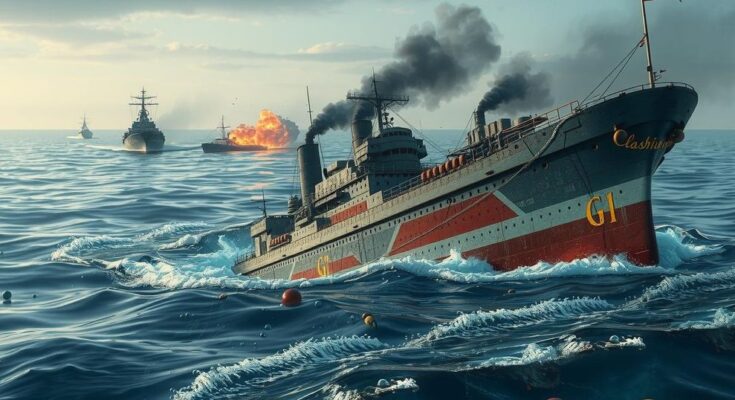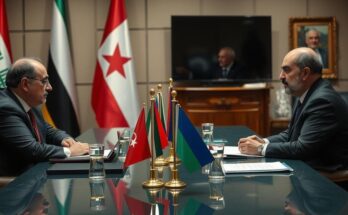The Ursa Major, a Russian cargo ship, sank in the Mediterranean while allegedly on a mission to acquire weapons from Syria. As North Korean troop casualties exceed 3,000, Ukrainian President Zelensky warns of increasing military collaboration between Russia and North Korea. Italy extends military aid to Ukraine until 2025 amid ongoing concerns about energy security in Europe and geopolitical complexities.
Recent developments in the ongoing conflict between Ukraine and Russia have yielded significant events, including the sinking of a Russian cargo ship, the Ursa Major, which is believed to have been on a mission to procure weaponry from Syria. The ship sank in the Mediterranean Sea following an engine room explosion, with two crew members reported missing. Concurrently, casualties among North Korean forces fighting alongside Russian troops have reportedly exceeded 3,000. Ukrainian President Volodymyr Zelensky warned of escalating military cooperation between Moscow and Pyongyang, suggesting that North Korea may deploy additional troops and military supplies to support Russia in its conflict with Ukraine.
Additionally, Ukraine continues to grapple with territorial losses while Italy has committed to further military assistance for Ukraine, extending its support until the end of 2025. This commitment aligns with a broader call from NATO for heightened military aid to Ukraine to bolster its position in potential peace negotiations. In a separate matter, President Zelensky criticized Slovak Prime Minister Robert Fico for hesitating to abandon Slovakia’s reliance on Russian gas, emphasizing the security implications for Europe.
These events underscore the complex geopolitical landscape and the intertwined fates of nations involved in the conflict, shaping the future trajectory of military engagements and negotiations in the region.
The ongoing conflict between Ukraine and Russia began in February 2022, following Russia’s invasion of Ukraine. This war has led to widespread destruction and significant loss of life, prompting international responses and military aid to Ukraine from various countries, notably in Europe and the U.S. As the conflict escalates, countries such as North Korea have reportedly sent troops to support Russian efforts, further complicating the geopolitical situation. Ukraine’s attempts to maintain military presence and capacity have been complemented by international support, reflected in military aid packages and alliances formed during this crisis. Italy’s recent law to extend military assistance to Ukraine illustrates the continued commitment from Western nations to aid Ukraine against Russian aggression while also deliberating how best to prepare for future negotiations.
In summary, recent events highlight critical developments in the Ukraine-Russia conflict, including the sinking of a cargo ship on a suspected arms mission and the alarming casualties among North Korean troops supporting Russia. President Zelensky’s warnings about increased military cooperation between Moscow and Pyongyang and his critique of European leaders regarding energy security reveal the ongoing challenges in this multifaceted war. With continued military support from allies such as Italy, the situation remains dynamic, necessitating vigilance and strategic responses from Ukraine and its supporters.
Original Source: www.independent.co.uk




